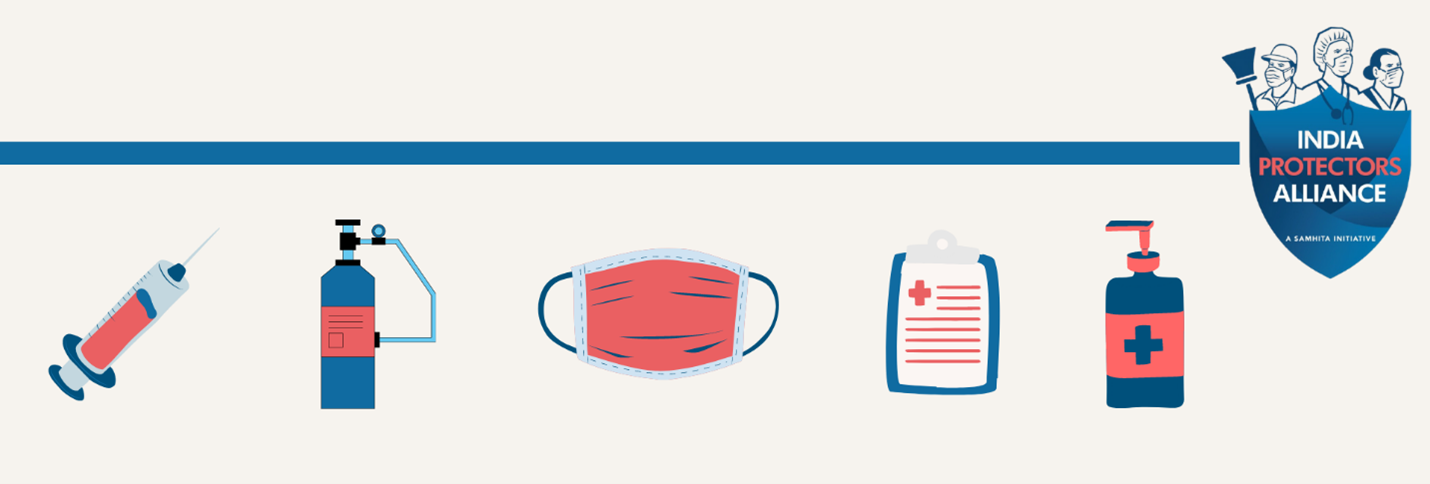India accounts for nearly half of the Covid-19 cases across the globe and one in four deaths, according to the WHO. Experts say that the actual number of cases and deaths due to the second wave of Covid-19 could be up to five times higher than what official data shows.
Hotspot locations running out of hospital beds, an oxygen crisis in key cities, critical drugs in short supply, a virus moving to underserved rural areas with weak healthcare infrastructure, and healthcare workers unable to cope with the amount of care seekers, all call for an urgent healthcare response by individuals and entities from all walks of life.
The pandemic has revealed just how interconnected the world is – if a country has very high levels of infection, then it’s likely to spread to other countries. As the World Health Organization’s Chief Scientist, Dr. Soumya Swaminathan said, “The virus doesn’t respect borders, nationalities, age, or sex or religion.”
In 2020, Samhita & CGF, CECP’s Global Exchange partner in India, created the India Protectors’ Alliance with Hindustan Unilever, RBL Bank, a multi-stakeholder partnership to respond to the needs of over 500,000 front-line health and sanitation workers and individuals from communities most impacted by the Covid-19 pandemic.
In 2021, Samhita-CGF and its partners are responding to the second surge of the disease which has overwhelmed the healthcare systems of large cities and has reached rural pockets where healthcare is rudimentary at best.
As advised by public health experts and in line with the government’s priorities, Samhita recommends funds be directed to fund the following critical interventions against Covid-19:
Oxygenation: Draining supplies of medical oxygen, vital for those who have been infected, is a major challenge faced by hospitals across the country. The focus is currently on meeting some of the demand with oxygenators. According to the National Clinical Covid-19 Registry, in the current wave of infections, 54.5% need oxygen support during the course of treatment, which translates to almost 200,000 oxygen concentrators.
In addition to oxygen concentrators, there is a need for other types of oxygen-related interventions, especially for more advanced cases – cylinders, ventilators (both invasive and non-invasive), and accessories to manage moderate to severe Covid-19 cases.
[You can support and connect with Samhita-CGF and other partners to donate oxygen concentrators to India, or set up ox. Samhita-CGF’s focus will be on clinics in India’s most vulnerable districts and rural areas]
- A high flow concentrator costs $1,165 and can treat up to 550 patients with a severe or critical illness.
Mass Vaccination: While the government and private players work out the supply side and offer vaccinations for free, there are huge challenges in ensuring the success of the vaccine drive in the form of vaccine hesitancy, vaccine access, and vaccine equity. Vaccine hesitancy could arise out of general misinformation, behavioral biases, or even out of overconfidence.
Here’s how companies, foundations, and social organizations can support the vaccination drive:
- Vaccination drives: Working with the government, companies, foundations, social organisations, etc. to push vaccinations on a large scale and ensure that no one is left behind. This can be achieved through interventions that are aimed at promoting vaccine access and equity – supporting sign ups on the vaccination portal, bringing vaccines closer to the communities, and promoting allied interventions such as mask wearing and teleconsultations.
- Information communications: To support the success of vaccination programs – addressing barriers such as hesitancy and queries about processes skillfully and empathetically.
- Campaigns: Mass media campaigns that motivate citizens to get vaccinated.
[Samhita-CGF and its US partner Global India Fund have activated organizations to implement mass vaccination programs across the country. This would include providing access to vaccines, masks, pain killers, and nutrition packets, as well as undertaking communication interventions that combat misinformation and campaigns that promote vaccination among citizens.]
India Needs Your Help
We are witnessing a terrible breakdown in healthcare systems in the country, from which we were still recovering from the first wave. This tragedy is spurring civil society, government, private sector funders, and philanthropists to look at a host of short-term interventions that respond to the current crisis, and long-term interventions that can create a better normal for the healthcare system, its personnel, and citizens.
In addition to oxygenation and vaccination, we are working with our partners on both tactical and catalytic interventions – healthcare support to front-line NGO workers, healthcare insurance, livelihoods support through blended finance, teleconsultations, Covid-19 recovery centers, and so on.
We urge you to join us and other organizations in helping India recover and keep the virus at bay.
Connect with Samhita-CGF and Global India Fund to provide support to India
Samhita is raising funds through the Collective Good Foundation (CGF). CGF is an independent registered charitable trust and has tax exemption on donations, contributions, or funds received, under S 80 G of the Income Tax Act, 1961. The foundation is also registered under Foreign Contribution (Regulation) Act, 2010.
Since its inception in 2006, CGF has worked with over 300 partners to provide comprehensive project implementation solutions for Corporations and Foundations to address issues of healthcare, education, water, Sanitation & Hygiene (WASH), and women’s empowerment. Donations can be routed through Global India Fund to CGF to avail tax benefits for US companies.
We have partnered with the Global India Fund, a U.S. based nonprofit to accept funds from the U.S. and provide tax receipts to U.S. based donors.
For more details, click here.


